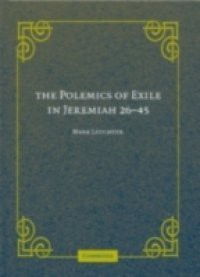Scholars typically view Jeremiah 26-45 as a collection of episodes constructed during the Babylonian exile that attempts to prove the authenticity of Jeremiah's prophetic status. But Jeremiah's prophetic legitimacy was already widely accepted during the period of the Babylonian exile. These chapters serve a different purpose, namely, to provide a response by the Deuteronomistic scribes to the rise of the Ezekiel tradition and the Zadokite priesthood that threatened their influence among the exilic population. By subsuming their work within an existing and earlier collection of Jeremianic literature, the ideology and political agenda of the Deuteronomists was fused with the literary legacy of a widely respected prophet, giving rise to a larger literary collection that left a profound and lasting impression on Israel's intellectual and social history.

